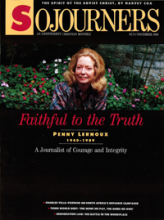The suddenness of Penny Lernoux's death has left all of us reeling from a loss we had no time to prepare for.
Penny was just 49 years old when she succumbed to cancer on October 8, 1989. First diagnosed only one month earlier, she had come to stay with the Maryknoll Sisters in New York while she received treatment. But it was too late. The prophetic voice that had reported to us for more than two decades from Latin America fell silent. None of us was ready. Penny Lernoux was buried in the Maryknoll Sisters cemetery.
It was only several weeks earlier that I had received a letter from Penny telling me she was on schedule for the special Sojourners issue on drugs we had planned together for the next spring. She would do the story from Colombia, where she had lived for many years. We would tell the story from Columbia Heights, where we live in the inner city of Washington, D.C. She sounded fine in the letter and made no mention of any problems.
The previous spring, Penny was with us in Washington, D.C., as part of her national book tour for People of God, her newest release. I introduced her at the book-signing party as a journalist who tells the truth and keeps the faith. It was that combination that made Penny Lernoux so rare and extraordinary in our time or in any time. She made a great impression when she spoke to the Sojourners magazine staff the next day.
For other journalists, she provided a bright light. She practiced her vocation with such integrity and courage and, in so doing, demonstrated how a Christian should be a journalist and how a journalist can be a Christian.
Read the Full Article

